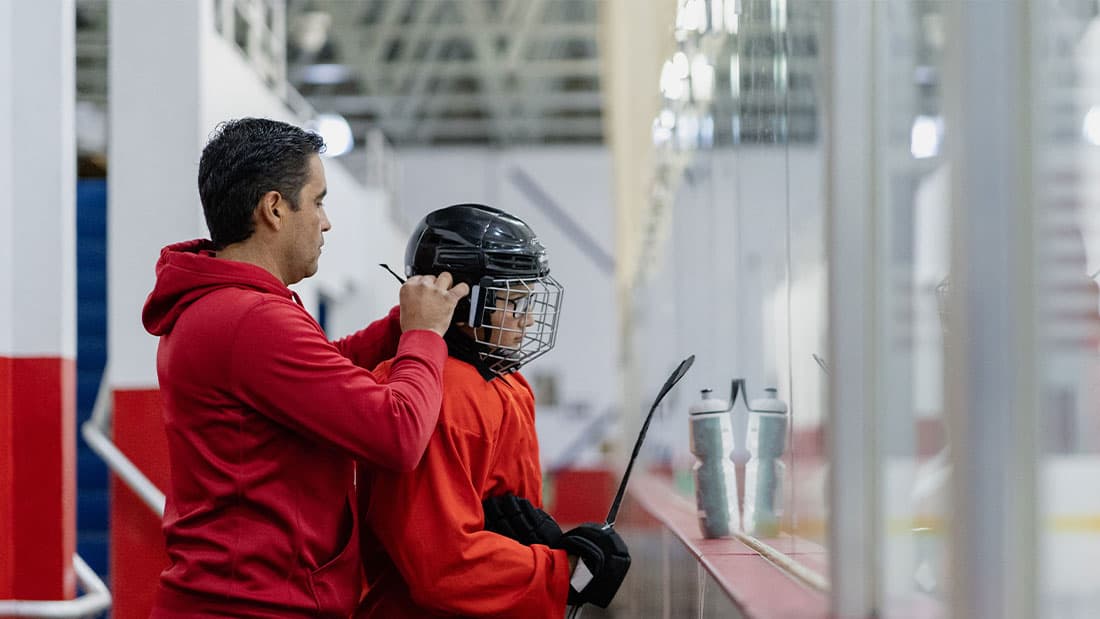In all areas of life and performance, the myth of motivation remains. The idea that some people are motivated while others are not, to make a character judgment based on the will to complete a task, is absurd.
The truth is that nobody is motivated all the time; that is not normal! Motivation is not a stable character trait. It fluctuates across time and is impacted by many variables, such as sleep and stress, and is an entirely different experience for every individual at different times.
However, the fact remains that, whether motivated or not, athletes have to train to perform. Your motivation dropped this week does not mean you can skip practice unless you like the view from the bench!
Thus, it is essential to develop skills and tactics for overcoming motivational slumps, as they will inevitably occur for every athlete.
5 Simple Routines
Implement these in your daily training schedule, whether your motivation is soaring high or sitting valley low.
1. Make a list. Check it off.
List-making is an incredibly underused yet straightforward productivity tool because all it requires is a piece of paper (or the Notes App in your phone), a pen, and a minimal amount of brainpower!
Although your motivation to perform in areas of your life outside of sport may be high already, list all the daily or weekly items you need to accomplish, injecting your training somewhere in the middle.
Yes, your list very well may look like taking a shower, run 1 mile, take out the trash, gym session, feed the dog, wash your hands, clean sports shoes, and go to sleep. And that is perfectly fine!
When you can cross items from your list, whether sport-related or not, dopamine floods your brain, and you receive a rewarding chemical jolt. Your list often results in feelings of positivity, accomplishment, and – you guessed it! – sometimes even motivation!
Allow yourself to list out all your To-Dos, sandwich your training in there, and garner some motivation from other areas of your life as your list shrinks and motivation soars throughout the day.
2. When you feel you cannot train, commit to just starting.
Whenever you are struggling with, overwhelm, if time is tight or energy is low, or any other situation when you feel less-than-motivated, start. Decide on a task to complete – and just start. Commit to driving to the gym and just stretching. Start by running one mile instead of two. Tryto walking to practice instead of practicing. Decide to do your warm-up.
When motivation wanes, tasks that are perceived as strenuous or exhausting – such training – become mentally and physically more comfortable to accomplish once you have begun, so you will likely find it easier to continue once you have broken out of the slump of starting. You may even discover that your training session or performance was far better than you could have expected before you started and felt accomplished and refreshed afterward.
Should you not finish the workout, at least you have accomplished something, which is always a significant improvement over nothing.
So, whatever your training or activity needs are, just make yourself start with something. The beginning is the hardest part.
3. Set goals for your sessions.
Before you begin a training session, whether in the gym or in your specific sport, set a goal for yourself to accomplish.
Ask yourself the following questions:
- What is the purpose of this session?
- What do I want to focus on in this time?
- Where and how do I want to improve?
- How can this specific session move me toward my bigger goals?
- Once you have a goal in your mind, stick to it. Tell a training partner or your coach, if having accountability is helpful to you. With every repetition, use that goal as an impetus, your driving force to put intentional, maximal effort into the session.
High motivation is not required for a highly productive, highly intentional training session, but having a realistic, specific, and individual goal can certainly help.
4. Implement self-feedback.
The ability to effectively evaluate oneself is an elite mental skill that athletes should learn as early as possible in their careers. The best performers in the world can reflect on themselves and their performance, identify areas of improvement, hold themselves accountable to improve on those areas and do the work.
A simple way to learn this skill is to start a training journal filled out every day after practice. In each entry, write what your goal for the session was and then reflect on whether or not you met that goal. If so, how? If not, why not?
Through this daily, two-minute exercise, you will learn to evaluate your strengths and weaknesses, identify ways to improve yourself and track your progress across time in these areas.
In times of low motivation and frustration, it can be extremely helpful to look back in your training journal and notice all the improvements you have made already in the past, and find new areas to develop in the present and future.
5. Prioritize your recovery.
It is essential to be focused on and give maximal effort during training, the most significant improvements to performance take place while recovering.
Training usually takes place one to four hours a day, depending on your sport and competition level. That means you have 20 to 23 hours per day to focus on regeneration, healing, and complimenting your body’s natural repair mechanisms.
This requires adequate and efficient sleep and nutrition, supplementation when necessary, and participating in non-sport-related activities. Even in times of severe lack of motivation to train, take control of, and responsibility for making your recovery as beneficial as possible. Improving this area of your non-training time will reflect positively in your performance.
Being consumed by your sport, and training can be severely mentally and physically taxing, taking the fun out of the game. When you optimize your recovery and set aside time to turn off the athlete and be a multidimensional human, you will likely notice your motivation for your sports spike again.
You feel better and have more energy from high-quality recovery, but your focus is not entirely on sport, nor your identity wrapped up in being a performer. Take the pressure off, relax, recover, and be a human.
RECOMMENDED FOR YOU
MOST POPULAR
In all areas of life and performance, the myth of motivation remains. The idea that some people are motivated while others are not, to make a character judgment based on the will to complete a task, is absurd.
The truth is that nobody is motivated all the time; that is not normal! Motivation is not a stable character trait. It fluctuates across time and is impacted by many variables, such as sleep and stress, and is an entirely different experience for every individual at different times.
However, the fact remains that, whether motivated or not, athletes have to train to perform. Your motivation dropped this week does not mean you can skip practice unless you like the view from the bench!
Thus, it is essential to develop skills and tactics for overcoming motivational slumps, as they will inevitably occur for every athlete.
5 Simple Routines
Implement these in your daily training schedule, whether your motivation is soaring high or sitting valley low.
1. Make a list. Check it off.
List-making is an incredibly underused yet straightforward productivity tool because all it requires is a piece of paper (or the Notes App in your phone), a pen, and a minimal amount of brainpower!
Although your motivation to perform in areas of your life outside of sport may be high already, list all the daily or weekly items you need to accomplish, injecting your training somewhere in the middle.
Yes, your list very well may look like taking a shower, run 1 mile, take out the trash, gym session, feed the dog, wash your hands, clean sports shoes, and go to sleep. And that is perfectly fine!
When you can cross items from your list, whether sport-related or not, dopamine floods your brain, and you receive a rewarding chemical jolt. Your list often results in feelings of positivity, accomplishment, and – you guessed it! – sometimes even motivation!
Allow yourself to list out all your To-Dos, sandwich your training in there, and garner some motivation from other areas of your life as your list shrinks and motivation soars throughout the day.
2. When you feel you cannot train, commit to just starting.
Whenever you are struggling with, overwhelm, if time is tight or energy is low, or any other situation when you feel less-than-motivated, start. Decide on a task to complete – and just start. Commit to driving to the gym and just stretching. Start by running one mile instead of two. Tryto walking to practice instead of practicing. Decide to do your warm-up.
When motivation wanes, tasks that are perceived as strenuous or exhausting – such training – become mentally and physically more comfortable to accomplish once you have begun, so you will likely find it easier to continue once you have broken out of the slump of starting. You may even discover that your training session or performance was far better than you could have expected before you started and felt accomplished and refreshed afterward.
Should you not finish the workout, at least you have accomplished something, which is always a significant improvement over nothing.
So, whatever your training or activity needs are, just make yourself start with something. The beginning is the hardest part.
3. Set goals for your sessions.
Before you begin a training session, whether in the gym or in your specific sport, set a goal for yourself to accomplish.
Ask yourself the following questions:
- What is the purpose of this session?
- What do I want to focus on in this time?
- Where and how do I want to improve?
- How can this specific session move me toward my bigger goals?
- Once you have a goal in your mind, stick to it. Tell a training partner or your coach, if having accountability is helpful to you. With every repetition, use that goal as an impetus, your driving force to put intentional, maximal effort into the session.
High motivation is not required for a highly productive, highly intentional training session, but having a realistic, specific, and individual goal can certainly help.
4. Implement self-feedback.
The ability to effectively evaluate oneself is an elite mental skill that athletes should learn as early as possible in their careers. The best performers in the world can reflect on themselves and their performance, identify areas of improvement, hold themselves accountable to improve on those areas and do the work.
A simple way to learn this skill is to start a training journal filled out every day after practice. In each entry, write what your goal for the session was and then reflect on whether or not you met that goal. If so, how? If not, why not?
Through this daily, two-minute exercise, you will learn to evaluate your strengths and weaknesses, identify ways to improve yourself and track your progress across time in these areas.
In times of low motivation and frustration, it can be extremely helpful to look back in your training journal and notice all the improvements you have made already in the past, and find new areas to develop in the present and future.
5. Prioritize your recovery.
It is essential to be focused on and give maximal effort during training, the most significant improvements to performance take place while recovering.
Training usually takes place one to four hours a day, depending on your sport and competition level. That means you have 20 to 23 hours per day to focus on regeneration, healing, and complimenting your body’s natural repair mechanisms.
This requires adequate and efficient sleep and nutrition, supplementation when necessary, and participating in non-sport-related activities. Even in times of severe lack of motivation to train, take control of, and responsibility for making your recovery as beneficial as possible. Improving this area of your non-training time will reflect positively in your performance.
Being consumed by your sport, and training can be severely mentally and physically taxing, taking the fun out of the game. When you optimize your recovery and set aside time to turn off the athlete and be a multidimensional human, you will likely notice your motivation for your sports spike again.
You feel better and have more energy from high-quality recovery, but your focus is not entirely on sport, nor your identity wrapped up in being a performer. Take the pressure off, relax, recover, and be a human.










